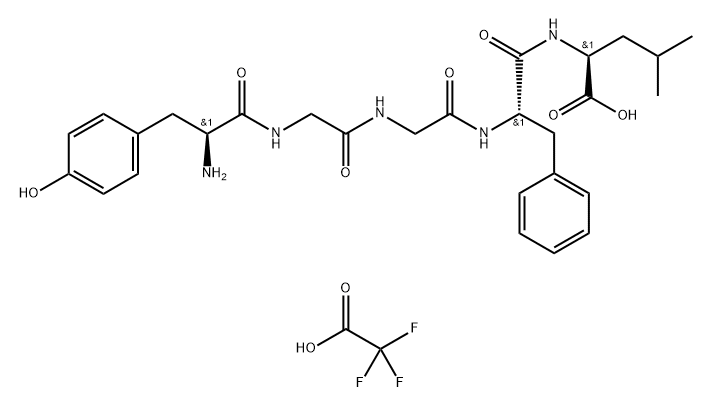Leu-Enkephalin is an endogenous neuropeptide involved in nociception and an agonist of δ- and μ-opioid receptors (Kis = 4.0 and 3.4 nM, respectively).1,2 It is selective for δ- and μ- over κ-opioid receptors (Ki = >1,000 nM).2 Leu-Enkephalin is a cleavage product of proenkephalin, which is found primarily in the adrenal medulla and the CNS.3 It is found in the brain, the brainstem, and the spinal cord as well as in the peripheral nervous system. Leu-Enkephalin (1 mg/kg) decreases the visceromotor response to colon distension in a mouse model of visceral pain induced by colorectal distension.4 It also increases the tail-flick threshold and latency to tail flick in the tail-pressure test and tail-flick test, respectively, in mice.5
1.Hughes, J., Smith, T.W., Kosterlitz, H.W., et al.Identification of two related pentapeptides from the brain with potent opiate agonist activityNature258(5536)577-580(1975)
2.Raynor, K., Kong, H., Chen, Y., et al.Pharmacological characterization of the cloned κ-, δ-, and μ-opioid receptorsMol. Pharm.45(2)330-334(1994)
3.Roques, B.P., Noble, F., and Fournié-Zaluski, M.-C.Endrogenous opioid peptides and analgesiaOpioids in pain control: Basic and clinical aspects22-25(1999)
4.Fabisiak, A., Sobociska, M., Kamysz, E., et al.Antinociceptive potency of enkephalins and enkephalinase inhibitors in the mouse model of colorectal distension-proof-of-conceptChem. Biol. Drug Des.92(1)1387-1392(2018)
5.Honda, M., Okutsu, H., Matsuura, T., et al.Spinorphin, an endogenous inhibitor of enkephalin-degrading enzymes, potentiates leu-enkephalin-induced anti-allodynic and antinociceptive effects in miceJpn. J. Pharmacol.87(4)261-267(2001)

![[Leu5]-Enkephalin TFA(58822-25-6(free bas)) pictures](/ProductImageEN1/2024-11/Small/e090e823-c9a1-4ded-a8c8-3f1cbf583a98.png)